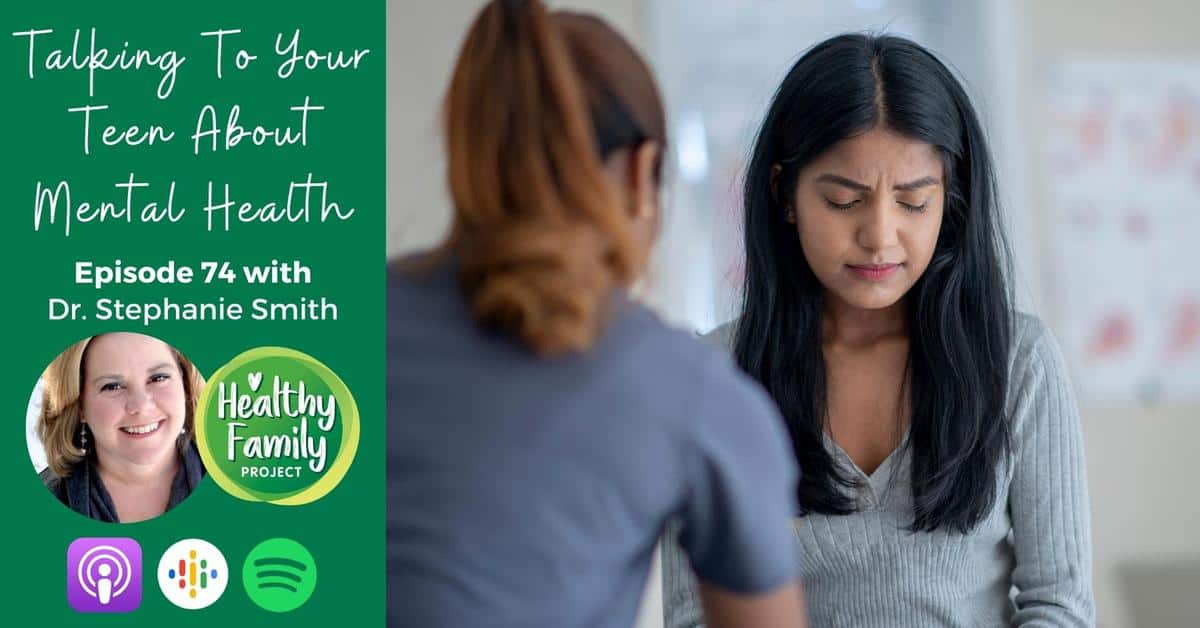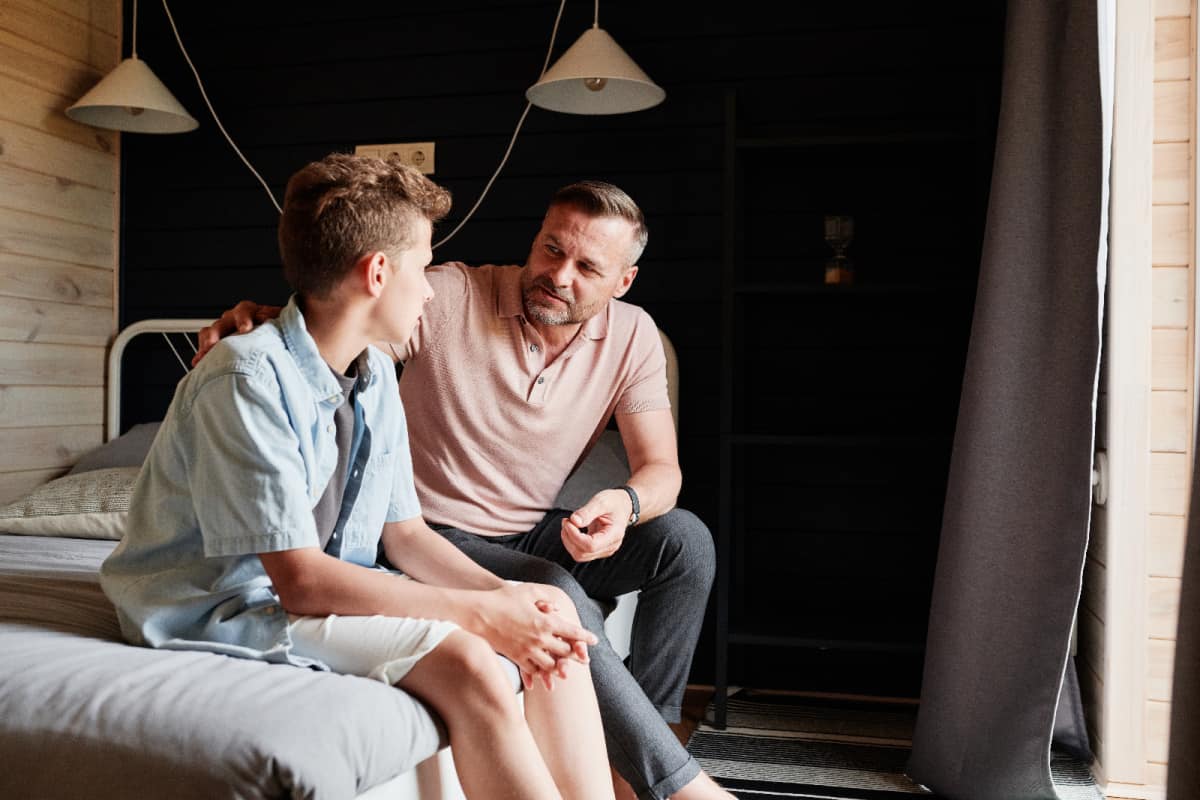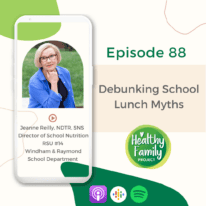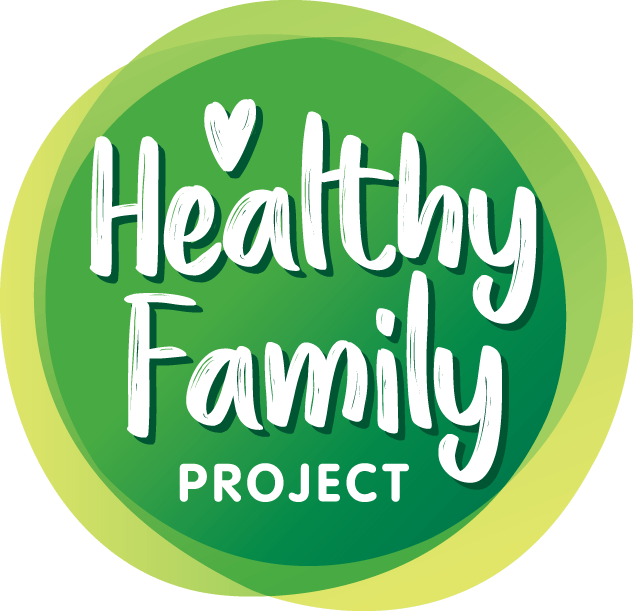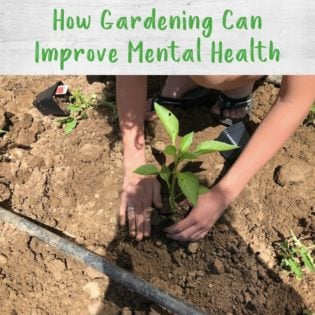Episode 74: Talking To Your Teen About Mental Health
On this episode of the Healthy Family Project Podcast, we’re joined by child psychologist Dr. Stephanie Smith. This episode is all about talking to teens about mental health, teen mental health and what parents need to know to navigate the teen years with their kids. Dr. Stephanie shares amazing advice for deciphering teen behavior, ways to keep family communication open and honest, and how to determine when professional help is necessary.
The teen years are hard. Outgrowing childhood but not quite an adult just yet, this period of time comes with lots of changes for teens and parents. As a parent, it feels like overnight, your little one who turned to you for everything is all of a sudden an angsty teen. The U.S. Surgeon General issued an advisory on the Youth Mental Health Crisis, and also published resources for protecting youth mental health. As a mom with a preteen and teen, this episode on talking to teens about mental health is near and dear to my heart. I am thankful for the opportunity to speak to Dr. Stephanie as well as the conversation from the U.S. Surgeon General on this very important topic.
Especially given the events children and teens have had to face since the pandemic started, it’s more important than ever to prioritize mental health and keep an eye out for changes in moods and behaviors that can signal to a larger problem.
Dr. Stephanie Smith has been a regular contributor to the blog and guest on the podcast for years. She joined us for this episode to share her expertise in child psychology and help parents navigate teen mental health struggles. Dr. Stephanie emphasizes the importance of keeping strong lines of communication, even as our teens pull away and want to become more independent. Tune in to the episode to hear more about behaviors to look out for, tips concerning privacy, and resources to turn to if a teen is in need of counseling.
About Our Guest, Dr. Stephanie Smith
Dr. Stephanie Smith is a mother, clinical psychologist and author of Dr. Stephanie. In her practice, she works with moms, dads, teens and tweens. Dr. Smith uses humor, compassion and common sense to help people make positive changes in their lives. She especially enjoys working with parents to assist them in strengthening their families from the inside out.
On her blog, she writes about technology, parenting, friendship, and pop culture – all with a mental health twist. In addition, Dr. Smith is an official blogger for the American Psychological Association’s blog, Your Mind, Your Body.
Listen to Talking To Teens About Mental Health episode
What We Cover:
Want to skip straight to a hot topic? See timestamps below. But of course, we recommend listening all the way through to get all the great tips and tricks!
- 2:08 Welcome back, Dr. Stephanie!
- 4:05 Tips for deciphering teen behavior
- 7:21 Rules for respecting privacy
- 12:35 How to determine if professional help is needed
- 16:00 School Counseling
- 17:37 Affordable Mental Health Resources
- 27:20 How can families be supportive when there’s a mental health struggle
- 31:54 Advice to parents who fault themselves
- 36:02 How to gauge if counseling is working
Relevant Links
- Ask the Psychologist: Holidays, Family, & Stress
- Mental Health Resources for Parents of Adolescents
- Helping Teenagers Cope with Covid-19
- Mental Health Literacy: Parenting Your Teen
- Check out Dr. Stephanie’s website
- Get in contact with Dr. Stephanie
Other Podcast Episodes to Check Out:
- Episode 70: How to Raise an Adult
- Episode 42: Meditation Benefits for Kids
- Episode 35: Helping Kids Make Good Choices
- Episode 25: Easing Test Anxiety in Kids & Teens
Healthy Family Project Facebook Group
Join our Healthy Family Project Facebook group! This group will serve as a safe space for parents and caregivers to talk all about raising a healthy family – from dealing with a picky eater and tips to get more fruits and veggies onto plates to exercising as a family and mental health. We welcome all of you to join in!
Listener Survey!
Thank you so much for supporting the Healthy Family Project Podcast! We’d love it if you could take 5 minutes to let us know how we can bring you the best possible content for future episodes. Take the survey here.
Healthy Family Project Podcast
Conversations covering hot topics in the world of health, food and family with a dose of fun. Helping families ease their way into a new fresh and healthy world.
Be on the lookout for new bi-weekly episodes and don’t forget to subscribe on Apple Podcasts, Google Podcasts, Spotify or your favorite podcasting site. If you like an episode, make sure to leave a rating and comment.
If you are interested in being a guest on the Healthy Family Project podcast, contact amanda@healthyfamilyproject.com with your topic idea for consideration.
Transcript for Episode 74
This transcript was produced by Otter.Ai. Please forgive any misspellings and grammatical errors.
00:09
Welcome to the healthy family project by produce for kids, covering the hot topics in the world of health,
food and family with a dose of fun. Hi, everyone. Welcome to the healthy family project podcast. I’m your
host Amanda, and glad you’re joining us again today or for the first time welcome, welcome. Today we
are touching on an important topic. And I really hope this helps families out there who are dealing with
mental health and their teens or truly just mental health. You know, learning more about mental health,
the more we can educate each other, the better we will all be. We are talking to Dr. Stephanie Smith, Dr.
Stephanie has joined us on several past episodes, including Episode 23, dealing with test taking anxiety,
and episode eight, anxiety around back to school. And I’m sure we’ll have her in the future for more
episodes after today. But today, we are specifically focusing in on the mental health as it applies to teens
and tweens. I have one of each, we pulled a few questions from our healthy family Project Facebook
group. If you haven’t joined the group, please do so. And find us on Facebook, do search and you’ll find
our page, our Facebook page, and then you’ll find our group. And we love to hear episode ideas and
feedback on the podcast. And really there’s just discussions over there on all things, families, you name
it, you’ll probably find it in there. We do talk a lot about food and nutrition. But you have a burning
question and need to bounce it off of some friendly people in a safe space. That’s that’s where to head.
So we hope to see you there. And we did have some great questions pop up in on this topic in the
Facebook group. And I’m really looking forward to speaking with Dr. Stephanie again today. Let’s jump in.
Welcome back to the podcast. Dr. Stephanie. It’s been way too long since we’ve last recorded an
episode. For those of you who don’t know, Dr. Stephanie, she’s been on several episodes, you’ll
definitely need to check those out. We’ll link up to those in the show notes. So before we jump in, why
don’t you tell listeners a little about you. And I really I haven’t talked to you for a while. So I want to know
what you’ve been up to what’s exciting going on?
02:30
Well, I’m not sure if there’s any. But I’m, I’m a psychologist in Colorado. And I have three kids, two
teenagers and a tween. And I am in private practice kind of in the boulder area. And I have been very
busy during COVID. And as we kind of all know, it’s been it’s taken a big toll on on I think everyone’s
mental health, but especially teenagers. So I’m glad that we’re gonna get a chance to talk about about
teens today.
03:09
Great. Yes, I I have some backgrounds, not professionally, on this topic. As most of you know, I do have
a team and a tween as well. So I’m in that boat. So let’s jump in here. I did ask in our Facebook group,
for questions for people to submit, you know, their their questions that they wanted me to share. And one
that I thought was really great was, how do you know like, where is the line? Because we all know,
teenagers are expected to be moody and hormonal and mad and, you know, shifting from happy to sad.
So that one of the questions was How do you know like, how do you know when it’s like, oh, this is we’ve
crossed the line, I guess into something that we need to address or is this just normal teen behavior?
04:06
I think that’s a really good question. And I’m not sure that there is a hard and fast rule for when we need
to seek care for a teenager. But a few things to keep in mind. I mean, the first probably most importantly
is trusting your own gut. If something just feels off or weird, or you just have that nagging sense that
something’s wrong, reach out and get services. There’s really not a huge downside to being proactive.
So definitely trust your gut. past that. I think sometimes kids ask so obviously if they’re asking to see a
therapist or a counselor, talk to somebody, you know, do everything you can to to fulfill that request. In
terms of things to notice in behave Your isolation is definitely one that we want to keep an eye on. So
obviously, kids probably spend a lot of time in their room. And last year was really weird when they
weren’t going to school. But now that schools are pretty much back in session, if you’re just noticing that
they’re spending hour upon hour upon hour alone, and maybe not doing the things that would, they
would normally do and enjoy. That’s a red flag for sure. So if they normally enjoy, I don’t know, this time
of year going to a pumpkin patch, or going to a youth group, or soccer or playing, even playing video
games, with friends online, whatever it is that their thing is, if they’re not doing that, in favor of isolating
themselves, it’s definitely time to make a call. Okay, that’s good
05:57
advice. I definitely feel like over here, you know, in my role, I just try so hard to keep communication lines
open and talk about things other than, you know, grades. And did you do this? Did you clean your room?
Did you above ABA? Because I tend to go down that path, as we all do as parents, but to try to work on
communicating and conversations that are outside of those things that are just kind of light. And I felt like
having kind of just those kinds of communication and conversations help me in my life to recognize when
things you know, seemed a little off. So, so what are your thoughts on privacy? This was another
question we had in the Facebook group. So someone said, you know, some kids don’t want to talk about
what they’re feeling. So, you know, it might be up to a parent to maybe dig a little deeper into the
communications they’re having with others text messages. One mom, one mom asks, you know, really,
how far do we pry, She also asks side note, is it normal for your team to like, everyone, but you but that’s
for another episode? But I do think it is. Normal, but what do you think about the privacy? How, how far?
Is it for parents to go to kind of figure out what’s going on?
07:23
This is such a good question. And one that I kind of grapple with both professionally and personally as a
mom. Because I think there’s danger on either side, you know, I think there’s danger in giving our kids no
privacy. And there’s danger in, you know, the opposite. Kind of giving them free rein, no, part of the
developmental task of every adolescent is to begin separating from their parents or caregivers, and
become a little more independent, and maybe rely more on their peer groups. So that’s one of the overall
tasks of adolescence Now, that doesn’t happen. By the time you’re 14. I mean, that may happen by the
time kids are 21, or 25, or 30. I mean, it’s a very long term task. But I think sometimes it can help parents
to keep that in mind, like it is normal, that kids start to separate from us. However, with that said, they’re
still children, they’re still living with us, for the most part, are still paying for their, you know, internet and
own and all that stuff. So I think I think that does, I hate to use the word entitle us, but to have more
information about what’s going on. So I think, you know, it’s okay to, I mean, and beneficial really, to see
if you can be friends or follow or whatever your kids online, Instagram, Snapchat, whatever. Obviously,
they can easily get around our prying eyes with those things. They’re much smarter than we are. Yes.
Um, but I think you know, other ways to kind of get more information. Are you really trying to talk to our
kids, give them a chance to talk to us in every kind of possible situation we can think of. So that’s like,
going going out to their favorite restaurant, playing video games with them, the games, they like, going
on walks, taking family vacations, driving in the car, in circles, like whatever, you know, just providing lots
of opportunities. These to talk because different kids are going to open up in different ways. I think it can
also be important to try to know our kids friends, that’s not always possible. But if you can just know them
a little bit, I think that’s good. If there’s a way to engage your kids with other adults that they don’t hate so
much. That can be great, too, whether it’s grandparents or teacher or an A neighbor that’s cooler than
you. Those are all ways to kind of have lots of eyes on your kids. So even if they’re not telling you exactly
what’s going on, there are other people that they’re hopefully telling or sharing with, that you could
communicate with if need be.
10:52
That’s good advice I have implemented that in our world of early on, I identified that, you know, the cooler
than me people and said, you know, hey, you can give me a call whenever you want or text me or
whatever it might be. And I think it’s been just been really good for her overall to have other, you know,
because you don’t want to hear the same thing over and over from your parents. But then if you have
someone else say, Yeah, you know what, your mom’s probably right. And she’s like, oh, yeah, that’s,
that’s right. You didn’t say it. But now because someone else said it? I agree.
11:29
Right? Or even like, gosh, I can see where your mom is concerned? Have you considered talking to her
this way? Or right? Or that or? But yeah, I think that, you know, years ago, it was the kind of popular
phrase to say it takes a village. And I think it kind of lost its meaning. But I think with teenagers, it’s, it
becomes even more important to like, try to put as many adults, young adults, old adults in their life as
you can. Sure,
12:05
yeah. It those examples, and just having more people to talk to and share with is really beneficial. I know
it has been great for us. Okay, so another question for you, once a parent or caregiver has identified that
their team needs help, how do they know if the team needs to see a psychologist, a psychiatrist, a
counselor, social workers, therapists, it’s, it’s very confusing. It is
12:34
very confusing. There’s like a million different mental health professionals. So you are definitely not
alone. If you have no idea who’s who and what’s what I would say the really the best place to start is with
your pediatrician. Especially if you have a relationship with them, which most kiddos I think, do have a
short or even a long term relationship. And they, they often feel fairly comfortable going to their
pediatrician, you know, it doesn’t set off alarm bells. So, you know, I think that’s a great place to start, just
make an appointment and say, Hey, we’ve noticed some concerns. These are the concerns the
pediatrician, I’ll probably want to talk to your child alone for a few minutes to understand a little bit more
about what’s going on. And then they’ll be able to help you come up with a plan. You know, if medication
is what you’re looking for, or what your kiddo needs. A lot of times pediatricians can manage that right
from their office. If they don’t feel like they can, or if it’s out of their scope of practice, for whatever
reason, they will refer you to a psychiatrist nearby that they work with. But like I said, most times,
pediatricians can at least start that process. Now, if you’re looking for therapy or counseling, which is
very often recommended in conjunction with any kind of medication, again, pediatricians typically
maintain a list of providers in the area that they have worked with and had good luck with and trust that
they can give you so you know, it may be some social workers or some masters level therapists and
some psychologists which are doctoral level therapists. And but it least it kind of, you know, maybe it’s
five or 10 people that kind of makes the list smaller. What type of therapist whether it’s a social worker,
psychologist, licensed professional counselor. It doesn’t really matter as long as they are, you know, well
established in your community and have experience with teenagers and kids and again, Let the
pediatrician be the one that helps you filter those folks out. Okay,
15:06
no, that’s definitely good advice. I feel like even which kind of takes me into my next question. But even
talking with like, the insurance companies, they’re like, Well, who do? What do you want? I’m like, I don’t
know. I don’t know where I need to go. So, pediatrician has definitely great guidance for families. And I
will say, in my experience to our school, and I think a lot of schools especially like with the COVID, you
know, pandemic, everything have mental health counselor on site? Well, you know, they’re not, they don’t
take the place, of course of any of the needs for these things, but it is an extra support. So I would say, if
you are going down this path to reach out to your school, and see, and also kind of in the same vein of
having someone to lean in, on or talk to, but just knowing they have someone at school that they can go
to in a time, you know, distress or, you know, they’re feeling that they really need to speak with someone
that they can get to that person pretty quickly. So I would definitely say check in with your school, as well.
16:19
Definitely, I, whenever I work with kids or teens, I always recommend that they form a relationship with
their school counselor. interventionist is another title, they sometimes have therapist, because, like you
said, it’s not they’re not mutually exclusive. Like you can work with both an outside person and someone
in the school. And it’s great. Since those counselors are embedded within the school system, the kids
can access them their selves, they don’t have to wait for mom or dad, right, make an appointment and
drive them there. There’s there’s a lot of power in that.
16:57
Yeah, for sure. I know, it’s been very helpful for us to have that support system and within the school.
Okay, so next, I can tell you, I really, I don’t have the best health insurance plan. Some of these mental
health services can be pricey. I know this from experience. So are there organizations out there that you
know of that can guide parents who might be worried about the financial burden of you know, addressing
these mental health issues? I know, sometimes office visits can be 100 $150 per hour, and it’s like, okay,
we need to be here weekly. And so that, you know, adds up pretty quick.
17:38
Yeah, so I guess, you know, the first thing I would say is kind of the the tips I already gave, sometimes
there are mental health providers embedded within pediatricians offices. And that would be oftentimes
covered by insurance in a in a more seamless way night, obviously, insurances are so different, like,
that’s becoming more common. So certainly ask about that. The other thing we talked about the school
counselors that’s free, and a good resource, those people are trained. And, you know, definitely
important to take advantage of that. In terms of outside therapy, or psychiatry, yes, it, it can get really
expensive. The first thing I would say about that is everybody’s different. But a lot of times, you don’t
have to go every week, and you don’t have to go for a super long period of time. Sometimes we get in
this mindset that like oh, my gosh, I’m going to be committing to like a year of weekly sessions. And for
that same amount, I could like practically buy a new car, like just because. But that’s not always the case.
In fact, it’s, it is more often the case that people don’t go as frequently and don’t go for as long and still
get benefit. I would encourage folks to be really upfront with their mental health provider and say, Hey,
like cost is an issue. Are there things that we can do? either? Do you have a sliding scale? Or are there
things that we can do in between sessions? To keep working on these things, but maybe we wouldn’t
have to go as often. Do you have session times or days that are less expensive? That actually does
happen?
19:47
Wow, I didn’t realize that.
19:49
Yeah, so I think be open. I mean, I have those conversations all the time with folks. I understand money
doesn’t grow on trees, you know, and so on. There are different things that folks can do to help minimize
the cost or at least have cost in mind when treatment planning is happening. Now, there are therapists,
embedded and other organizations, oftentimes, very large churches, if that’s something you’re
comfortable with, you know, can often have mental health providers as part of their staff. And those are
maybe free or very low cost, because they’re supported by the church. Obviously, that’s not comfortable
for everyone. But that can happen. If your teen is part of the LGBTQ community, there are often supports
and services that are funded, either by state or local governments are other LGBTQ support
communities that are free and low cost. And just like if you were dealing with grief, and needed services,
you know, local hospice chapters often provide grief services, the same can be true for like LGBTQ
youth. So it is daunting, for sure. But there are resources out there, if you’re willing to be a little bit flexible
to like, maybe be part of a group, or like I said, you know, get services through another type of
organization, a church or LGBTQ group or, you know, whatever, right. It does take a lot of, like work, I will
say, I mean, it’s just, it’s sad, it shouldn’t, but it does.
21:51
I know. And, you know, it’s crazy, because it’s like, you recognize that your team needs help. And then I
think there’s some of these things that come up that, you know, like, even the question of is it it’s
psychologist, psychiatrist, or counselor, like making the appointment, you know, just finding the time in
the day to drive to the place and get you where you need to be and everyone on time? And so I feel like
you determine that, yes, there’s, there’s a issue that we need to address. And then I feel like, that’s just
the beginning. Because then you’re you have all these roadblocks. I guess they were blocks, but like,
hurdles, I guess that you’re like, oh, my gosh, now I have this, like, can’t someone just say, hey, go do
this be here. Done?
22:39
Know, for sure. It is, it’s, it’s, it’s a part time job, if not a full time job. You know, if you have a child that is
struggling with any kind of illness, mental illness, or otherwise, I mean, that it’s, it’s a lot, for sure.
22:55
And I was talking to someone the other day, I said, you know, you know not to be super dark about it. But
you know, just not addressing things and getting things moving sometimes could be really a matter of life
or death. Sadly, I know, in our community, we’ve had, you know, several suicides over the past year and
a half in our team group. And it’s like, I hate to think about it, but I also think like, how quickly can I, you
know, start the process? And I don’t, you know, for others, if some of these questions can help move
things forward and not help feel like there’s so many hurdles in the way then, you know, I really hope that
that helps.
23:40
Yeah, and, you know, my colleagues and I, other psychologist, friends and colleagues here, you know,
we’re certainly very busy, and our practices have been very full. And we understand that parents are, you
know, at their breaking point, yes. And so they get, oftentimes when they call and we say, I’m sorry, we
haven’t been up for a while, or, you know, it’s at a weird time or whatever. And frequently, they get really
angry, you know, and it I don’t think they’re angry at us, but they’re angry because of the situation. So I,
you know, in that situation, I would say, I try to be kind and realize that the people you’re calling or
emailing are going through this junk just like you and just try to be flexible and pleasant. And you
probably will get in sooner. Yeah, I know. I
24:47
know. I totally agree with you. I feel like probably and it’s the like, sad part of it is that the the parents, you
know, maybe again, another benefit to talking through a lot of these things today. is maybe addressing
things earlier before you are at a point, which I know isn’t always possible. Or you’re at, like that point
where it’s like, I have to do something now. Or, you know, like right now, like, we need help, like, today.
And so I think when you’re, like, maybe some of the things we talked about earlier, addressing things
early on, and knowing what your options are, and kind of educating yourself on, on, you know, what
might be going on, in that world maybe could help, you know, alleviate that, like, okay, it’s like, no, this is
like, totally not to compare it. But with me with my hair, it’s like, I let my hair grow to the point where, like,
I don’t, I’m just like, I don’t have time for hair cut. I don’t have time for a haircut. And then I get to the point
where I’m like, I need a haircut right now. Like, I need it today. And I’m like calling and I’m bad. And I’m
like, see, this is like not a good system. So yeah, no, that’s
25:59
a great, and that’s a great example. And it’s nasty to the receptionist on the phone. Yeah, I’m gonna go
out of her way to write you. But if you’re like, Yes, I’ll be on a cancellation list.
26:11
Right? Yeah, that’s the other. That’s another good call to cancellation lists. I feel like, if you are in a in a
bind, asking that question, when you call, there are cancellations. So
26:24
always, always, always. So that’s that flexibility piece. And, yeah, especially for those first few
appointments, if you can just kind of make it work. And then a lot of times, you can get on a schedule,
that’s gonna suit your family better.
26:41
Right. Okay. All right. So, I mean, life still goes on during times of struggling growth. So how would you
direct a family to be supportive during a time when there’s a mental health struggle? And I might even
add to that question, when you have other siblings, and the focus suddenly becomes on the team, right?
Where everything shifts, like, we need to focus here and get this taken care of. So what are your
recommendations on family support system, I guess, and not like totally leaving other siblings and
children like out out on out of the mix?
27:22
Well, I think it’s important to first of all, understand that not everything is going to be fair all the time. And
that’s okay. So there are going to be periods where one child or parent or whoever dog in the family is
going to need more care and time and effort than the others. That’s just the way it is. That’s part of being
in a family. And so it doesn’t help to beat ourselves up about it as parents, because it just is what it is. So
I think that’s an important first step, you know, try to get rid of the guilt. With that said, I think the more
you can keep your normal stuff that you do as a family normal, the better. So if that means you order
pizza on Friday nights, even if your teenager who’s having a terrible time no longer eats wheat, tomatoes
or cheese, like, we keep ordering pizza, and they can bowl cereal or whatever they’re going to do. You
know, if you like to go out to brunch on Sunday mornings, or even enjoy watching the football games on
Monday nights, or whatever it is, and I think all families have something. Even if we don’t recognize it as
traditions, I think we almost all do. You know, keep those up. And I think it, it helps the other kids in the
family feel some sense of normalcy. I think it helps us as parents feel some sense of normalcy and also a
little bit of relief, like, okay, there are still some good things and yes, yes. And I think it helps the teen,
even if they’re not participating or even if they’re participating, but being kind of jerks. gives them some
sense of stability, like, okay, like, I’m maybe feeling unstable and awful, but my family is kind of a rock for
me. And I know that every Friday, they’re going to order pizza, and maybe I feel like crap and maybe I
hate pizza, but this is still gonna go on, even if I’m not participating in it. And I think that is really
important. They may not know it, but deep down in there, I think there’s importance in that.
29:54
Yeah, there is and I have to say myself, you know, when there’s it’s hard Because everyone’s in this
negative space, and it’s like, why do we even want like, I don’t want to sit down with all these negative
people for dinner, you know, like, I don’t want to be sucked into this. So it is hard. And I found myself like,
I mean schedules and activities coming back to kind of knocked our family dinner off. But family dinner is
something always so important to me. And, you know, just over the, I don’t even know, the past six
months, it’s like, we really have, we’re having family dinner, because it was just not a happy space. But I
have started, like implementing it back into the schedule, and we’re getting back. And even though
sometimes it’s not the most joyous occasion, you know, we go through peaks and pits and talk about the
good part of the day and the bad part of the day. That’s the only requirement of speaking at the dinner
table. But it is better. Like you said, it does feel like oh, well, this is normal. Like, this is like something
that I have that we have together and we know it’s going to happen.
31:09
Yeah. And it’s okay. If it’s not every day, there’s not a magic, you know, potion that if you have dinner
together every single day, then you’re better off. I mean, it’s just the best we can write, even if it’s one or
two days or every other week, or, you know, I mean, we just got to do what we can do. You know,
especially in the really hard times. Right?
31:34
So I know we’re coming up on time here, but I do have two more questions we’ll get through. So this kind
of segue from the last question, what is your advice to parents who feel like maybe this is their fault, like
they did something wrong down the parenting road, that sent their child or teen in this direction?
31:55
Well, here’s the deal. We’ve all done a million things wrong, like I’m certain I’ve done 10 things wrong,
just today and the way it is, and we’re not going to change that, because none of us are perfect. And
parenting, especially teenagers is really hard. I think the best thing we can do is try to have an open
mind, and an open attitude to learning new things, or understanding our children or ourselves in a
different way. Learning from others being open, you know, if our kids mental health provider, talks to us
about potentially making some changes within the family system, you know, be open to that. And
considering that, and being vulnerable ourselves, you know, I think that’s the very best thing. And the
only thing really, we can do because if we expect perfection in ourselves and our children and our
partner, it we’re just going to always be disappointed. And, by the way, nobody on this planet has ever
parented through a pandemic before. We’re still in it. It we are going to be discovering the ramifications
of COVID. For years, I mean, it’s going to be years and years and years so that, you know, just giving
ourselves the grace to do the best we can. And like I said, have that open attitude to learning new things,
doing things, different ways, trying out different strategies, listening to our children, when they ask us to
do things, different ways. Now, that doesn’t mean we always should. But I do think it’s important to be
open. And yeah, just trying to get rid of that guilt. Because it. I mean, that is much easier said than done
speaking from someone that carries a lot of guilt myself,
34:07
say, waving both hands over here, hey,
34:12
nothing good comes of it. It just it doesn’t produce good fruit. You know, it just makes us feel really bad
and makes us want to stay in bed. And that, that doesn’t get anybody anywhere.
34:26
Right. And I think having the conversations to with your team, you know, working through those things
yourselves, but also being like transparent with your team that like, Hey, I’m working on these things. I’ve
been trying to do that a little more with mine so that we’re like, I’m not perfect. You know, she’s like, Well,
you do this and you know, everything has to be this way and bah bah bah and I’m like, Yeah, but you
know, that’s me. She she’s actually totally side note. My team has been reading quotes from quotes, my
quotes I’m in her notes section of her phone, when they’re when she reads them out of context of bad
parenting. I’m like, that’s not what I meant. What do you hear the full conversation? So she had one, or
she read me yesterday and it said, You do you? I’ll do me whatever is your jam is your jam. We’ll all get
through it.
35:25
Oh, I kind of like that, though.
35:29
So I was like, Oh, Jesus, be like published somewhere Sunday, like the book of parenting fail? No, no.
They are pretty funny, though.
35:40
So you really start keeping track of things? She said. I’m sure though.
35:43
Yeah, silly. That’s a good idea. Actually, I’m gonna have to start that in my notes section. So. So just to
round it out? How can parents gauge if the help they’ve identified is working? I know, you can probably
tell right away, but like, is there something that you look at? What’s the gauge?
36:03
Oh, that’s such a good question. And I wish I had a great answer. You know, I think first asking your
teenager, what they think asking the therapist or psychiatrist or whoever, what they think. And those are
important ways to measure. But I guess kind of back to where we started today, like, what are some red
flags we need to be aware of, you know, is that isolation piece? So if your kid is really struggling with
depression and particular, or social problems, isn’t they’ve been in treatment for a while? Are you noticing
that they’re isolating less? Are they engaging any more with the family, with friends, with classmates, that
can be one of the first glimmers of change that we notice is just they’re maybe a little more open to doing
things, maybe it’s not the things you want them to do, or maybe it’s gray, whatever, that’s a separate
conversation, but just a little more engaged in the world. You know, that that is something that would be
important to see. But again, it’s, it’s a slippery, weird process, mental health treatment, I wish it wasn’t.
But it is, and it can, it can be hard to understand progress. So I would just really try to be in
communication as much as you can, with your kiddo and or the provider, and just talk really regularly
about that. Because the therapist will most likely see some change before you will, you know, they might
start engaging in the therapy sessions a little bit differently, or open up a little more, or share a little more
vulnerable information or private information. You know, as I say, just try to be patient, I know it’s really
hard. But even small little wins and changes, you know, write them down, keep keep them on your
phone, like, cherish those, because it’s not going to be a linear, like every day is a little bit better than the
next sadly, doesn’t work. That way, it’s a little better, and then a little worse, and then a little better and a
little worse. So over the course of several months, we might be at a better place than where we started.
But it’s going to be full of ups and downs. So that’s why I say we kind of have to keep track on like paper
or a phone of what’s going on because our memory, if we rely on our memory, it’s not very good. Or if we
rely on what’s going on today. It might not be an accurate indication of what’s gone on in the last month.
Right? Does that make sense? That’s kind
39:07
of all over though. It does. And actually, we just had a conversation here last night about I don’t even
know. Like Tina and I were talking and I said something about, like where we are now. And she said, well
just think of where we were at this time last year. Like what how I felt and how we all felt. And you know,
and I thought oh, yeah, we’re in great shape. Yeah. Last year, last October, and this mental state of all of
us I think here in our house like oh, we are You’re right. We it seems like we’re we still got our things
which you always have our things but you know, we are in a much better place than last year at the
same time. So no, I
39:53
think that I’m glad she said that. I mean that because we are almost all this horrible group. quarters of
even our mood three days ago. And most of us are really terrible having any kind of perspective. Yeah,
that’s the way we are as humans. So, yeah, I think any, any way we can keep track in any kind of more
objective way? It can be really helpful. For sure.
40:26
Well, I think we have covered on a lot of great topics today. And I think we probably have a handful for
follow up episodes. To dive a little deeper into if you feel come back to us. We’d love to have you. Can
you tell listeners where they can connect with you?
40:46
So I no longer really have any social media. That’s my own mental health. I might be druggie. But I am
online at Dr. Stephanie smith.com. That’s my website that has my information about how to contact me
through phone or email. But but that’s about it these days. All right.
41:10
Well, I like it streamlining. Good for your mental health. I agree. I need to get on board. Well, thank you
for joining us today. I am so excited for everyone to hear this episode and get some feedback and then
plan for our next conversation. I love it. Thank
41:26
you so much for having me.
41:29
Thank you for joining us today to talk about this important topic. If you like healthy family project, please
tell a friend and leave us a rating it will only help our visibility so we can continue to create a healthier
generation. If you want to find me direct I’m Amanda and Kieffer on Instagram, and I’m also in our
Facebook group, the healthy family project, having conversations over there and you can find healthy
family project on Facebook, Twitter, Instagram, Pinterest, Tik Tok and YouTube. Be sure to subscribe


